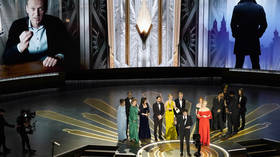Top Zelensky aide slams Oscars over 'Navalny' award


The refusal to allow Ukrainian President Vladimir Zelensky address the Academy Awards ceremony before awarding an Oscar to a documentary about Russian activist Alexey Navalny has drawn a furious reaction from Kiev.
Key Zelensky advisor Mikhail Podoliak took to Twitter to complain that the decision means politics and movies do mix after all.
“If the Oscars are outside of politics how should we understand the documentary manifesto Navalny where internal Russian politics is overflowing?” Podoliak asked, “If the Oscars are out of the context of the war in Ukraine [and] the mass genocide of Ukrainians, why do you constantly talk about humanism [and] justice?”
The Academy of Motion Picture Arts and Sciences had declined Zelensky’s request to address Sunday’s ceremony for the second year in a row now. While there has been no official comment on the matter, US media outlets reported that Hollywood wanted to “steer clear of anything political” amid concerns that giving attention to Ukraine might offend non-white people around the world.
Since the conflict with Russia escalated in February 2022, Zelensky has appeared via video link before film festivals in Cannes, Berlin, and Venice. He has also addressed the Grammy Awards and the Glastonbury music festival and virtually ‘rang’ the opening bell at the New York Stock Exchange in September, among other appearances.
Officially the senior adviser to the president’s head of office, Podoliak has been one of the most outspoken voices of the government in Kiev, second only to the president himself. Last week, he lashed out at the luxury brand Louis Vuitton, imagining an anti-Ukrainian message in the company’s long-standing logo based on the French flag.
‘Navalny’, a CNN-HBO production directed by Canadian filmmaker Daniel Roher, won the Academy Award for best documentary on Sunday. The film focuses on the alleged poisoning of the man Western media outlets have described as Russia’s “opposition leader.”
Navalny’s wife accepted the award on his behalf, as he is currently serving a prison sentence for fraud and parole violation. A Moscow court found him guilty in 2014 of defrauding the Russian subsidiary of the French cosmetics producer Yves Rocher and another company, to the tune of some $400,000. Navalny has denounced the charges as fabricated and politically motivated however the French company has never denied the charges.